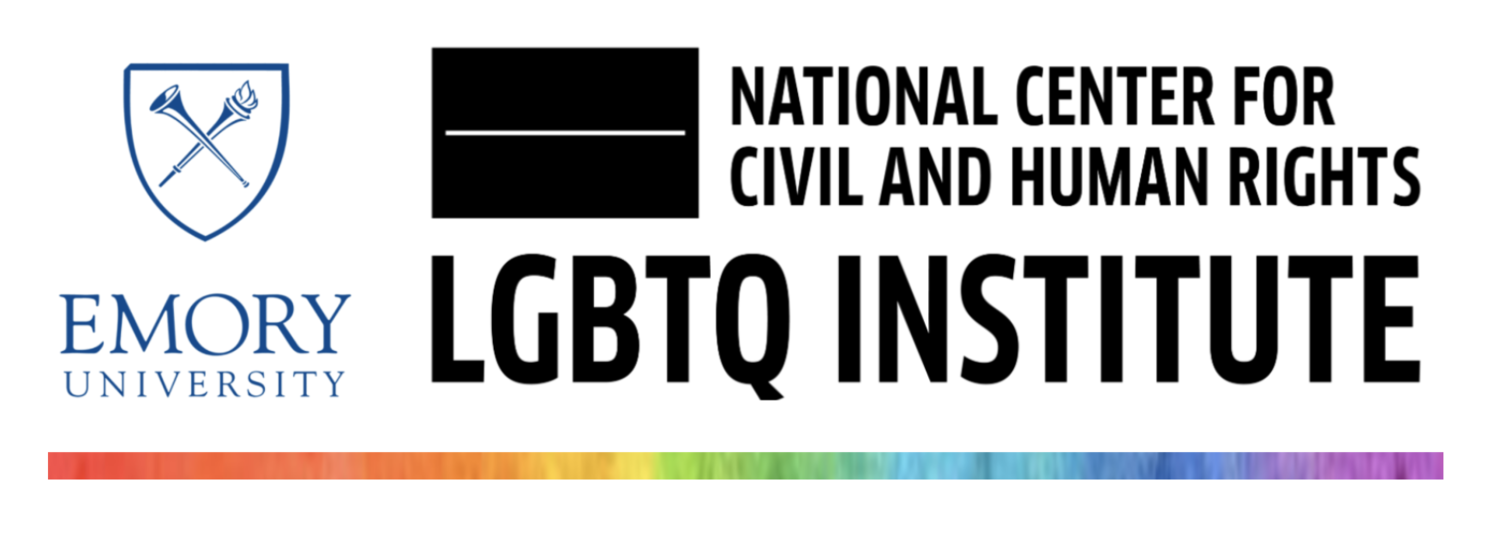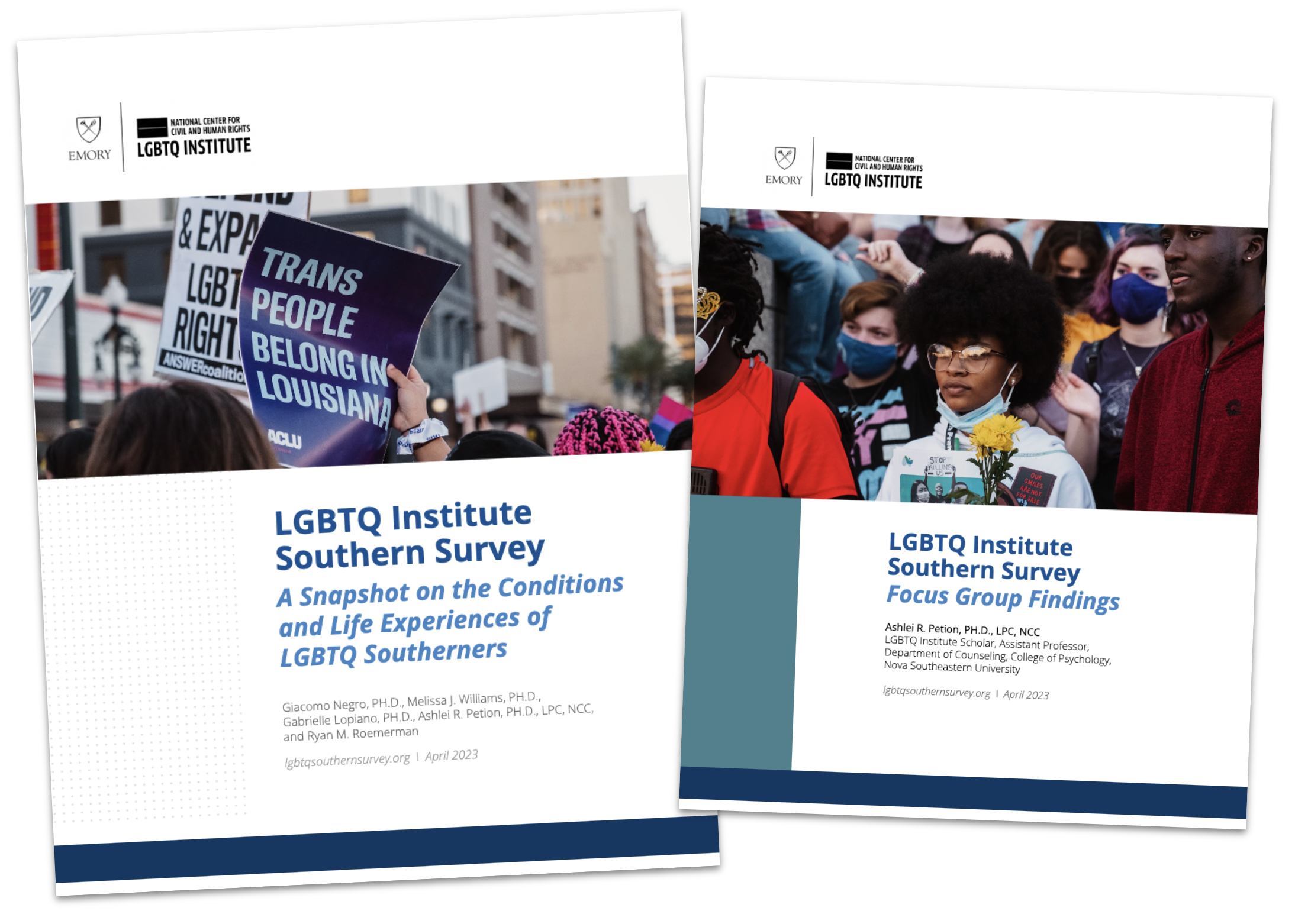2022 General Findings Report
The LGBTQ Institute Southern Survey: Filling a Critical Research Gap Regarding the Lives of LGBTQ Southerners
This survey and focus group findings are an ongoing effort of the National Center for Civil and Human Rights LGBTQ Institute to raise awareness and contribute knowledge about the experiences of LGBTQ people in the South.
A Message from LGBTQ Institute Executive Director, Tim’m T. West (he/they)
My familial roots include Appalachia and rural Arkansas. I know what it's like to grow up and live in the South. This report provides a brief snapshot of the lives of those we surveyed. A special thank you to the 1,326 LGBTQ Southerners who took the time to tell us your story. This work would not have been possible without you.
Our survey has some major strengths: It has a large sample size and was generated with the help of a large network of community organizations. There are many questions on a wide range of topics and fills the gap in representative surveys of LGBTQ people. Though we slightly increased participation among people of color since our last survey, (17% to 21%) participation rates are still underrepresented in the sample, given their rates in the population.
Therefore, we asked respondents of color who agreed to be part of our research panel to take part in a follow-up survey and a series of focus groups. Thanks to LGBTQ Institute Scholar Ashlei R. Petion, PH.D., LPC, NCC for conducting this additional study for this report so that we may amplify the lived experiences of LGBTQ communities of color.
There is more work to be done, and we hope that this survey report helps fill a critical research gap and leads to a better understanding of the LGBTQ Southern experience, creating a safer and more welcoming South.
Key Findings
Key findings from responses provided by 1,326 LGBTQ adults who completed the LGBTQ Institute Southern Survey living in Alabama, Arkansas, Florida, Georgia, Kentucky, Louisiana, Mississippi, North Carolina, Oklahoma, South Carolina, Tennessee, Texas, Virginia, or West Virginia. Overall study design and methodology is available in the published report.
Among the key findings of the survey:
LGBTQ Identity and Experiences
22.5% of respondents reported being under 10 years old when they first felt that they were LGBTQ+, with a majority (58.1%) feeling this way by age 14.
55% of respondents reported telling someone else that they were, or might be, LGBTQ+ before they were age 20.
78% of respondents think their LGBTQ+ identity is something positive in their lives, and 56% consider this identity as important to how they see themselves. Yet, more than 83% of respondents reported having been subject – a few times or more frequently in their lives – to slurs or jokes because they are, or are perceived to be, LGBTQ+.
Respondents reported most often being out to friends and family and least likely being out to extended family members and co-workers.
Transgender respondents between 18-29 years of age were most likely to report having been made to feel unwelcome at a place of worship or religious organization because they are, or were perceived to be, LGBTQ.
One in ten reported experiencing efforts to "convert" or change their sexual orientation and/or gender identity (‘conversion therapy’).
Education
54% of respondents reported having been harassed or bullied for being LGBTQ+.
Multiracial/Other identified respondents were most likely to report having changed schools to avoid or minimize discriminatory treatment.
20% of respondents reported having skipped school to avoid discrimination.
25% of transgender respondents reported skipping school to avoid or minimize discriminatory treatment for being LGBTQ+ in high school. Less than twenty percent of respondents ages 18-29 described faculty and staff as having been supportive or very supportive.
Employment/Workplace
More than 56% of the respondents view their workplace as very accepting for LGBTQ+ employees, and 71% of the respondents answered having more than one individual that they consider an ally at work.
But 55% of respondents avoided talking about personal topics with coworkers, supervisors, or bosses to avoid discrimination or harassment at work for being LGBTQ+.
Black respondents were less represented in our sample. At the same time, their experiences of sexual assault by a coworker, boss, client, or customer constitute with the experiences of Multiracial/Other respondents the majority of sexual assault experiences within our survey cohort (6% and 8% respectively).
67% of respondents who identified as bisexual/pansexual and 75% of transgender respondents said they avoided talking about personal topics with coworkers, supervisors, or bosses in order to avoid discrimination or harassment at work.
Respondents who identified as bisexual/pansexual (46%), and over half (52%) of transgender respondents said they actively tried to pass as not being LGBTQ+ in order to avoid discrimination or harassment at work.
Black and Multiracial/Other respondents were less represented in our sample, however, their experiences of sexual assault by a coworker, boss, client, or customer constitute the majority of sexual assault experiences within our survey cohort.
Healthcare
Nonbinary and transgender respondents were, respectively, more than two and four times as likely than male or female-identified respondents to report avoiding accessing health care over the past year for fear of a negative reaction or unequal treatment.
31% percent of transgender respondents reported avoiding healthcare.
2 out of 5 (20%) of transgender respondents reported receiving inappropriate curiosity from health care staff when trying to access health care this year.
4 in 10 (43%) transgender respondents reported being misgendered or inappropriately named when trying to access health care this year.
Economic and Political Power
A large majority of respondents are politically active, informed on current events, and contribute financially to candidates: 70% of respondents donated to campaigns in the previous twelve months or earlier, with 71% saying they donated to candidates who supported LGBTQ+ rights.
Respondents confidently exert economic power - 93.4% of respondents refused to purchase products from companies who are unsupportive of LGBTQ+ rights. Nearly 93% rewarded companies supportive of LGBTQ+ rights by purchasing their products.
Political Attitudes and Voting Behavior
Respondents' top priorities for LGBTQ+ community advocates and state political leaders were protecting marriage for same-sex couples, health care coverage for transgender people, adoption rights for same-sex couples, and stopping laws that permit discrimination against LGBTQ+ people on the basis of religion.
95.7% or respondents reported that they were registered to vote with 91.7% having voted in the 2020 presidential election.
27.2% strongly approve of how President Joe Biden is handling LGBTQ-related issues, with 39.7% somewhat approving; 19.7% neither approving or disapproving. One in ten (13.3%) of the respondents disapproved of how the President was handling LGBTQ-related issues.
Local and Community Involvement
Attending an LGBTQ+ pride event (81.8%), attending a rally or march supporting LGBTQ+ rights (68.4%) and being a member of a state of local LGBTQ+ organization (57.6%) were the next most common activities respondents were engaged in, with half (49.9%) reported being a member of a national LGBTQ+ organization.
Travel and Leisure
The most important factor for respondents, when considering travel in the South, was the things to see and do (57%), with concerns about safety and security being the second most important factor (27%) when traveling.
The majority cited Atlanta, Georgia as the most accommodating destination; followed by Asheville, North Carolina; New Orleans, Louisiana; and Key West, Florida.
Citation for General Report Findings: Negro, Giacomo, Melissa J. Williams, Gabrielle Lopiano, Ashlei R. Petion, and Ryan M. Roemerman. 2023. State of the South: A Snapshot on the Conditions and Life Experiences of LGBTQ Southerners. Atlanta, GA: National Center for Civil and Human Rights LGBTQ Institute.
Citation of Focus Group Findings: Petion, Ashlei. 2023. LGBTQ Institute Southern Survey: Focus Group Findings. Atlanta, GA: National Center for Civil and Human Rights LGBTQ Institute.
Statement of Independence and Objectivity: The National Center for Civil and Human Rights LGBTQ Institute and Emory University is committed to rigorous, independent research. We do not alter our findings and conclusions to accommodate funders, other organizations, government bodies or officials.
For more information or to schedule an interview:
NCCHR LGBTQ Institute Contact: James Richards, 404-844-4692 x.119, jrichards@civilandhumanrights.org
Emory University’s Goizueta Business School Contact: Melanie Buckmaster, 404-862-6226, melanie.buckmaster@emory.edu
The LGBTQ Institute at the National Center for Civil and Human Rights connects academics and advocates to advance LGBTQ equity through research and education focused on the American South.
The National Center for Civil and Human Rights is a museum and human rights educational institution located in Atlanta, GA, the cradle of civil rights. Founded in 2014, we create dynamic and empathy-building experiences, teach history’s connection to the present, generate brave and difficult conversations about necessary issues, and inspire the change-maker in each of us to tap our own power to promote civil and human rights in our communities and the world. The Center connects the U.S. civil rights movement of the 1950’s and 1960’s to global human rights movements for the rights of people of color, women, immigrants, people with disabilities, LGBTQIA+ people, and other marginalized groups. Through our Diversity, Equity and Inclusion initiative, the Campaign for Equal dignity, the LGBTQ Institute, expansive educational offerings, and immersive and engaging storytelling we inspire each of us to reflect and think critically, exercise empathy in action, and create positive change locally and globally. For more information about The Center, visit our website at civilandhumanrights.org. Follow us on: Facebook, Twitter, and Instagram - @ctr4chr, and LinkedIn at linkedin.com/company/ncchr.
Emory University’s Goizueta Business School: Business education has been an integral part of Emory University’s identity since 1919. That kind of longevity and significance does not come without a culture built on success and service. Emory University’s Goizueta Business School offers a unique, community-oriented environment paired with the academic prestige and rigor of a major research institution. Goizueta develops business leaders of today and tomorrow with an undergraduate degree program, Full-time MBA (Two-Year MBA & One-Year MBA), Evening MBA, Executive MBA, full-time and part-time MS in Business Analytics, Master of Analytical Finance, Doctoral degree, and a portfolio of non-degree Emory Executive Education courses. Together, the Goizueta community strives to solve the world’s most pressing business problems. The school is named for the late Roberto C. Goizueta, former Chairman and CEO of The Coca-Cola Company. For more information, visit goizueta.emory.edu.



